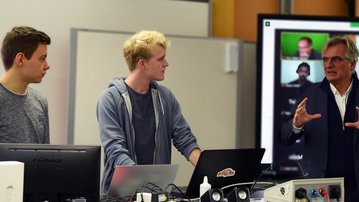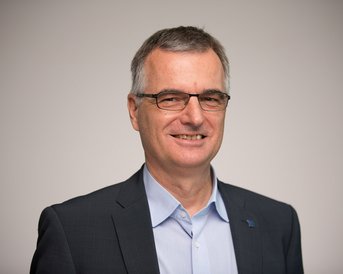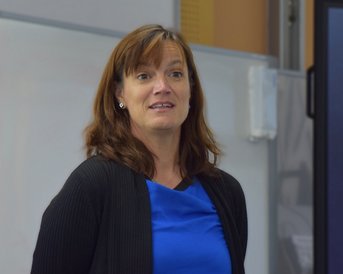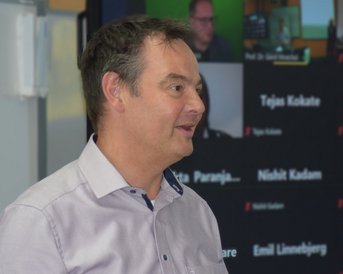
First-semester students of the Master's programme Applied Computer Science have developed planning concepts for the development of a mobile learning platform for children with hearing impairments.
First-semester students of the Master's programme Applied Computer Science have developed planning concepts for the development of a mobile learning platform for children with hearing impairments.
First-semester students of the Master's programme Applied Computer Science have developed planning concepts for the development of a mobile learning platform for children with hearing impairments as part of their first learning course "International Project Management". To illustrate this, the students designed different learning game scenarios that support children in their hearing and language development.
How does a chicken cluck? How does a goat bleat? People who are only learning to hear cannot yet know this due to a lack of listening experience. In order to support deaf or hard-of-hearing children between the ages of 4 and 6 who are learning to hear with a cochlear implant or hearing aid, students of the Master's programme Applied Computer Science have developed templates in their first module of the programme that are to be integrated into an app for the Staatliches Sonderpädagogisches Bildungs- und Beratungszentrum Luise von Baden (SBBZ) in Heidelberg / Neckargemünd. A test of the particularly CORE kind: a big pinch of practice, a kilo of creativity, a ton of teamwork, the whole thing hybrid and with students from India, Germany, Denmark and Egypt thoroughly international!
A look back: The SBBZ Luise von Baden in Heidelberg and Neckargemünd took part in the Ferry Porsche Challenge (ferry-porsche-challenge.de) this spring. The basis was the project idea of an audio learning game platform developed in

cooperation with the SRH, which Niveditha Ramanujan, Master's student of Prof. Dr. Gerd Moeckel, realised on the Moodle learning platform in the form of a prototype. With this idea, the project "Luise lauscht", the SBBZ received the special prize of the Ferry Porsche Challenge. Now, in the next step, the assignment for Moeckel's course and his colleague Gabor Kovacs from the SRH Hochschule Berlin was to develop concepts for a learning platform with game templates such as a quiz or a memory. For this, Moeckel brought in further expertise: Dr. Michael Nürnberg, Vice President of SAP University Alliances. In the final exam of the module, external practitioners also gave their feedback on the students' presentations. "It's a real-life project," said Noëlle Soerensen, Director of the SBBZ Luise von Baden, at the introduction.
Due to the current travel restrictions, 60 per cent of the course participants were online. "I am very happy about this and therefore use all the possibilities of digital presence teaching to be able to work with both groups - by the way, this will also be the future in companies," Prof. Moeckel knows.

Employees need to use all possibilities of communication and be able to judge when which media and technologies can be used for which purpose.
The students Emil and Julian started their presentation: In their quiz, for example, they show a picture of a goat. The children now have to choose the right sound from three audio files. "It was important to us to take the children's perspective into account," the two students explain. The next team, two students online, the third live on site, has designed a memory template. Cards with pictures appear on the screen, to which the children have to select the appropriate sound. The next team, in turn, has assigned sounds to objects in a room that the children have to find - clattering kitchen cutlery, for example, or a running tap. In this way, the little games of all eight teams are suitably tailored to the children, their world and their needs.
Noëlle Soerensen thus experiences the cooperation with the SRH University of Applied Sciences Heidelberg as "very exciting and helpful. Experts from two completely different disciplines are working on a project together, enriching and inspiring each other: students are working on tasks with a practical relevance, children with special educational needs can benefit from the ideas developed for implementation in the future. The immense opportunities and possibilities of the interdisciplinary project 'Luise lauscht' are obvious and we are excited about the further course of events."

The immense opportunities and possibilities of the interdisciplinary project 'Luise lauscht' are obvious and we are excited about the further course of events.
Dr. Michael Nürnberg also greatly appreciates the cooperation with the university: „Since several years, I have the sincere pleasure and honour to attend at the final results presentations of the International Project Management lecture held by Prof. Moeckel at SRH University Heidelberg. The University is a very close partner and long term member within the SAP University Alliances program.

The student teams always demonstrate a high level of creativity and communication skills capabilities, especially important in these times.
"The projects presented in November 2021 were outstanding, as a real life challenge from a real `customer´ was supported from various angles – this shall become the new normal for the future IPM projects!“
The planning concepts created by the students with the presented illustrative examples should then be taken up again and concretised in the following learning events under the respective aspects ("SW Architecture and Development", "Usability and User Experience Design", "IT Security", etc.).